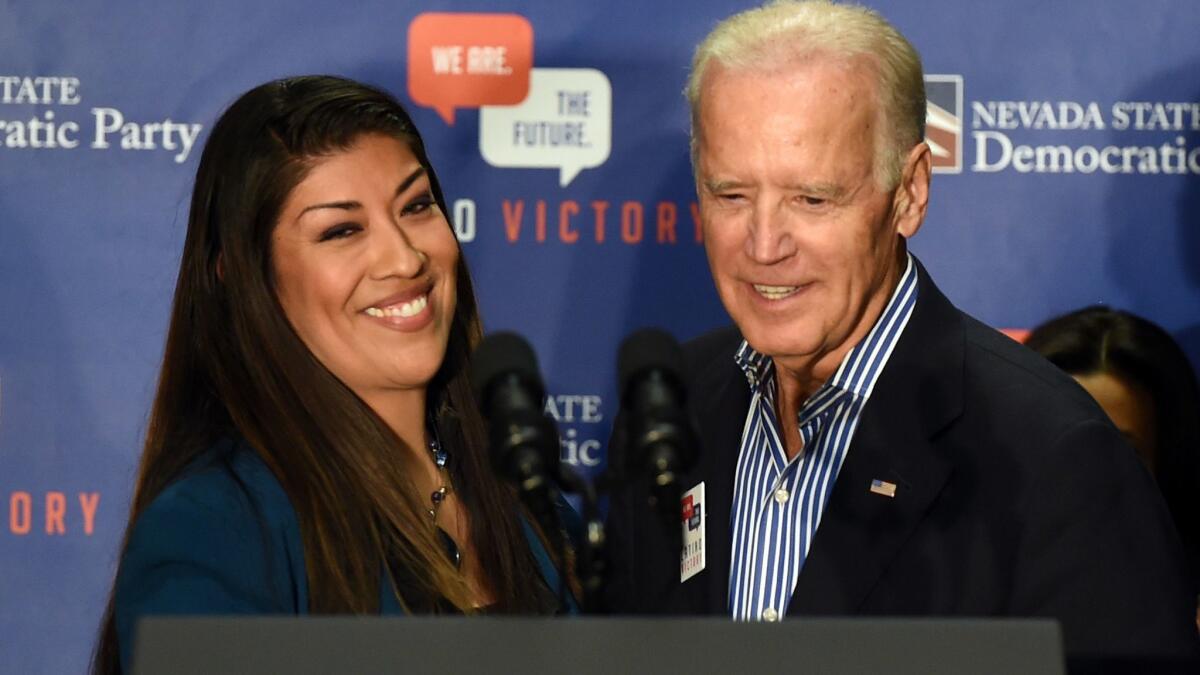Joe Biden, criticized for his treatment of women, promises to be ‘mindful’ of personal space

- Share via
Reporting from Washington — Former Vice President Joe Biden, facing a crisis that could hobble his 2020 presidential campaign even before it is launched, stepped up damage-control efforts and, for the first time, personally responded to complaints from women who say they were uncomfortable with his tendency to touch and hug people he meets in politics.
“Social norms have begun to change; they have shifted,” Biden said in a two-minute video posted on Twitter. “The boundaries of protecting personal space have been reset and I get it. I get it.”
“I will be more mindful and respectful of people’s personal space,” he added.
The controversy about what Biden himself has called his “tactile approach to politics” has buffeted his campaign-in-waiting for days, underscoring the new political dynamics in the first presidential campaign of the #MeToo era. It also laid bare the generation gap between the 76-year-old Washington veteran and many women — especially younger women — who are a crucial constituency in the Democratic Party.
Biden may have more to say on Friday, when he will make his first public appearance since the storm broke — a speech to a labor union conference in Washington.
The storm began for Biden when Lucy Flores, a former Nevada assemblywoman, wrote in a New York Magazine post that she felt demeaned and disrespected when Biden touched her offstage at a 2014 campaign rally. She said she felt Biden’s hands on her shoulders and froze.
At least three other women have since reported having felt similarly uncomfortable with Biden’s behavior. His staff has issued written statements denying he acted inappropriately but showing respect for the women’s right to speak out about their experiences.
But even Rep. Nancy Pelosi (D-San Francisco), the House speaker and a Biden ally, has said he needed to do more.
“He has to understand in the world that we’re in now that people’s space is important to them, and what’s important is how they receive it and not necessarily how you intended it,” she said at a Politico event Tuesday.
Biden’s supporters welcomed his statement — an unpolished, simple video of him alone speaking straight into the camera — saying it was important for him to address the issue directly.
“The most important thing you can do in these situations is own the moment and express a willingness to learn,” said Steve Schale, a longtime supporter in Florida. “He did that in the video.”
But it is far from clear whether the video response will be enough to put the issue to rest.
“The catchphrase of the day is authenticity,” said Rose Kapolczynski, a Democratic political strategist who is neutral in the 2020 primary. “Voters are rightly cynical about politicians, and what they say and believe and what they promise. The bar is very high to convince voters that you get it.”
While Biden explained his hands-on way of greeting and comforting people as an expression of his compassionate desire to connect with people — “Politics to me has always been about making connections,” he said — he did not apologize.
“It was definitely important that he come out and say something in his own words,” said Jess McIntosh, a Democratic strategist who was an aide to Hillary Clinton’s 2016 campaign. “But the fault I find is that he deflects responsibility. He blames changing social norms. I would have liked to hear an actual apology.”
McIntosh compared the statement to the way Biden has seemed to disavow responsibility for the Senate Judiciary Committee’s handling of Anita Hill’s sexual harassment allegations against then-Supreme Court nominee Clarence Thomas in 1991. Critics say the committee’s hearings were demeaning to Hill and didn’t take her allegations seriously enough.
Although Biden was chairman of the committee at the time, he said last week at a charity event in New York, “To this day I regret I couldn’t come up with a way to get her the kind of hearing she deserved.”
Biden has not yet officially joined the crowded field of Democratic candidates for president in 2020, but he has been expected to do so in late April or May.
Who’s running for president and who’s not »
People close to Biden say they do not believe this controversy will tip the balance against him running.
He hinted at his imminent entrance in his Wednesday video when he began, “Folks, in the coming month I expect to be talking to you about a whole lot of issues, and I’ll always be direct with you.”
But the issue underscores one of his biggest potential liabilities. His four decades in politics appeal to people looking for an experienced nominee, but much of the energy in the party is coming from young progressives.
His explanation that “social norms have begun to change” is a reminder that Biden, who was first elected to the Senate in 1972, is a man of another political era.
“The challenge for any older candidate is the country moves forward and not backwards,” said Democratic pollster Peter Hart. “Tactically speaking, I just think he’s got a lot more problems ahead of him than opportunities. It is just the year and the direction Democrats seem to be in at this stage.”
Times staff writers Eli Stokols and Mark Z. Barabak contributed to this report.
More to Read
Get the L.A. Times Politics newsletter
Deeply reported insights into legislation, politics and policy from Sacramento, Washington and beyond. In your inbox three times per week.
You may occasionally receive promotional content from the Los Angeles Times.











